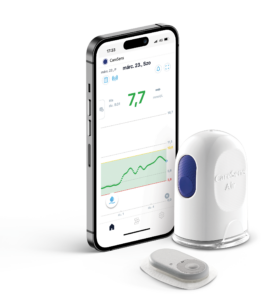The Hungarian company 77 Elektronika Kft. is introducing a continuous sugar monitoring system at home
The 100% Hungarian 77 Elektronika Kft. is introducing a new generation, continuous sugar monitoring system at home. The integrated sensor-transmitter device, which is a pioneer in the domestic market and works in Hungarian, provides a much more user-friendly solution for diabetics than before, which continuously measures the tissue sugar level 24 hours a day.
 The real-time sugar monitoring system sends the values to the corresponding smart device application every five minutes, so the patient and his doctor can immediately monitor how, for example, food, exercise, or certain medications affect the patient’s sugar metabolism. Thanks to the device’s customizable alarm system, it warns the user of dangerous values in time.
The real-time sugar monitoring system sends the values to the corresponding smart device application every five minutes, so the patient and his doctor can immediately monitor how, for example, food, exercise, or certain medications affect the patient’s sugar metabolism. Thanks to the device’s customizable alarm system, it warns the user of dangerous values in time.
77 Elektronika Kft. was the first in Hungary to make fingertip blood sugar monitoring widely available to diabetics. The 100% Hungarian-owned 77 Elektronika company group, which develops and manufactures the Dcont® blood glucose meter product line, continues to play a leading role in the Hungarian blood glucose meter market.
Related news
A fruit day doesn’t cure or sustain you – that’s why most corporate well-being programs don’t work
🎧 Hallgasd a cikket: Lejátszás Szünet Folytatás Leállítás Nyelv: Auto…
Read more >Related news
Nestlé to sell remaining ice-cream assets but commits to Froneri venture
🎧 Hallgasd a cikket: Lejátszás Szünet Folytatás Leállítás Nyelv: Auto…
Read more >









